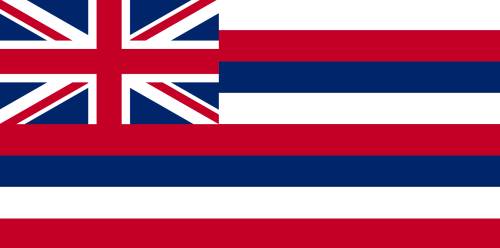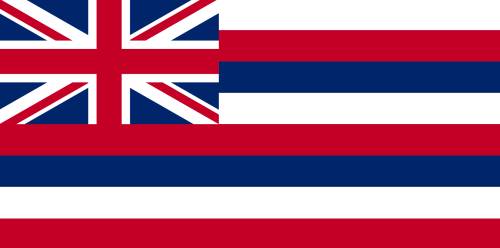Hawaii is a state that is fairly infamous regarding its restrictions on gun rights, but happily it is far more lenient when it comes to the carry and ownership of knives.
Within the state there are some bans on specific categories of knives that, combined with some fairly blurry language regarding what does and what does not fit the state’s definitions and standards, can make it tricky to determine whether or not your knife is illegal.

Hawaii is additionally hampered by a lack of statewide preemption, meaning you will have to obey all local and municipal laws concerning knives wherever you go, complicating travel. More happily, there are no length restrictions on knives in Hawaii so you won’t have to worry about that, which is good.
We will crack open the Hawaii state laws concerning knives below and tell you everything you need to know.
What You Need to Know
- What Kind of Knives Can I Own?: Any kind of knife except a butterfly knife or switchblade; assisted opening knives likely qualify as switchblades.
- Can I Carry a Knife Concealed Without a Permit?: Any knife that is not a banned type, a dirk, dagger or “deadly or dangerous weapon.”
- Can I Carry a Knife Concealed With a Permit?: Any knife that is not a banned type, a dirk, dagger or “deadly or dangerous weapon.”
- Can I Carry a Knife Openly?: Any knife that is not a banned type, a dirk, dagger or “deadly or dangerous weapon.”
General Ownership
A couple categories of knife are banned in Hawaii specifically; you are not allowed to even be in possession of them. This includes butterfly knives, switchblades and by extension ballistic knives thanks to the wording of the statutes.
Sadly, this likely also includes common assisted opening knives, since Hawaii’s laws lack any special exemptions or the now common “bias towards closure” language that has been making the rounds in order to protect assisted opening knives from erroneous classification as switchblades.
Police are authorized to arrest immediately and confiscate any such restricted weapon, which will then later be destroyed by the chief of police. This is particularly troubling because the statute that defines deadly weapons and the prohibitions thereof does not define, at all, the term “deadly or dangerous weapon”.
What qualifies as a “deadly or dangerous weapon”? As is so often the case it is really entirely up to the soon-to-be arresting officer.
This is sort of a subcategory of the entirely too-common “ordinary pocket knife” fallacy that crops up commonly in many states without modernized legal language.
If you cannot define something, how can you abide by it? You would be wise to make sure any knife you are carrying in the state of Hawaii lacks any aggressive-looking tactical features or other accoutrement, and generally appears as pedestrian as possible.
Concealed Carry, No Permit
You may not carry concealed upon your person or any vehicle you are occupying any Dirk, dagger, or other deadly or dangerous weapon.
The state statutes are clear: Anytime you are found armed with any such weapon a law enforcement officer can and will arrest you for a misdemeanor charge before confiscating said weapon. Whatever the outcome of the interaction, the confiscated weapon will be destroyed.
Again, make sure any knife you choose to carry is as plain and ordinary as possible if you want to avoid such an unhappy fate.
Concealed Carry, With Permit
Hawaii’s concealed weapons permits are legendarily difficult to obtain, but even if you do get one it does not afford you any additional privileges; they only apply to firearms.
A person who is otherwise in good standing with the state who is also in possession of a concealed weapons permit may not carry any additional type of knife concealed that you would not otherwise ordinarily be allowed to carry without the permit.
Open Carry
Hawaii does that make any special exemptions for open carry vs. concealed carry of knives. One of the state statutes, 134-51, uses the specific language in regards to mode of carry “found armed”, meaning that having any restricted type of knife on or about your person in any way is enough to violate the statute.
Prohibited Places
Technically, you may carry your knife into any place that does not have signage or placard prohibiting the carry of knives or other weapons. This includes schools.
However, I must advise against doing so in the strongest possible terms since the state of Hawaii has on the books statutes that assert the state may charge and prosecute for “inchoate” crimes, an inchoate crime being any one where the state may prove through evidence that a person was planning to commit a crime but decided not to go through with it.
Don’t screw around; don’t take your knives into school houses or any place that has a restriction on the carry of weapons!
Assessment
Hawaii is an acceptable state for knife owners, though the odious restrictions on type and class of knife as well as a positively vague restriction on deadly and dangerous weapons means you will always be walking on eggshells when selecting a knife for everyday carry.
Though the state lacks a blade length restriction that might be cold comfort when the length of the blade itself might be used as a determining factor for whether or not it is a dangerous weapon, and therefore illegal. Make sure you are on your best behavior in the Aloha State if you want to carry a knife.
Important Hawaii State Statutes
Read up on the following state statutes governing the ownership and carry of knives in the state of Hawaii. At the end of the day, correctly understanding and interpreting the laws is the only thing that will keep you safe.
If you have any doubts or questions make sure you contact a competent attorney in the state who can interpret them for you.
134-51 Deadly weapons; prohibitions; penalty.
(a) Any person, not authorized by law, who carries concealed upon the person’s self or within any vehicle used or occupied by the person or who is found armed with any dirk, dagger, blackjack, slug shot, billy, metal knuckles, pistol, or other deadly or dangerous weapon shall be guilty of a misdemeanor and may be immediately arrested without warrant by any sheriff, police officer, or other officer or person. Any weapon, above enumerated, upon conviction of the one carrying or possessing it under this section, shall be summarily destroyed by the chief of police or sheriff.
(b) Whoever knowingly possesses or intentionally uses or threatens to use a deadly or dangerous weapon while engaged in the commission of a crime shall be guilty of a class C felony.
…
§134-52 Switchblade knives; prohibitions; penalty.
(a) Whoever knowingly manufactures, sells, transfers, possesses, or transports in the State any switchblade knife, being any knife having a blade which opens automatically (1) by hand pressure applied to a button or other device in the handle of the knife, or (2) by operation of inertia, gravity, or both, shall be guilty of a misdemeanor.
(b) Whoever knowingly possesses or intentionally uses or threatens to use a switchblade knife while engaged in the commission of a crime shall be guilty of a class C felony.
…
134-53 Butterfly knives; prohibitions; penalty.
(a) Whoever knowingly manufactures, sells, transfers, possesses, or transports in the State any butterfly knife, being a knife having a blade encased in a split handle that manually unfolds with hand or wrist action with the assistance of inertia, gravity or both, shall be guilty of a misdemeanor.
(b) Whoever knowingly possesses or intentionally uses or threatens to use a butterfly knife while engaged in the commission of a crime shall be guilty of a class C felony.
…
134-9 Licenses to carry.
(a) In an exceptional case, when an applicant shows reason to fear injury to the applicant’s person or property, the chief of police of the appropriate county may grant a license to an applicant who is a citizen of the United States of the age of twenty-one years or more or to a duly accredited official representative of a foreign nation of the age of twenty-one years or more to carry a pistol or revolver and ammunition therefor concealed on the person within the county where the license is granted. Where the urgency or the need has been sufficiently indicated, the respective chief of police may grant to an applicant of good moral character who is a citizen of the United States of the age of twenty-one years or more, is engaged in the protection of life and property, and is not prohibited under section 134-7 from the ownership or possession of a firearm, a license to carry a pistol or revolver and ammunition therefor unconcealed on the person within the county where the license is granted. The chief of police of the appropriate county, or the chief’s designated representative, shall perform an inquiry on an applicant by using the National Instant Criminal Background Check System, to include a check of the Immigration and Customs Enforcement databases where the applicant is not a citizen of the United States, before any determination to grant a license is made. Unless renewed, the license shall expire one year from the date of issue.
(b) The chief of police of each county shall adopt procedures to require that any person granted a license to carry a concealed weapon on the person shall:
(1) Be qualified to use the firearm in a safe manner;
(2) Appear to be a suitable person to be so licensed;
(3) Not be prohibited under section 134-7 from the ownership or possession of a firearm; and
(4) Not have been adjudged insane or not appear to be mentally deranged.
(c) No person shall carry concealed or unconcealed on the person a pistol or revolver without being licensed to do so under this section or in compliance with sections 134-5(c) or 134-25.
(d) A fee of $10 shall be charged for each license and shall be deposited in the treasury of the county in which the license is granted.


